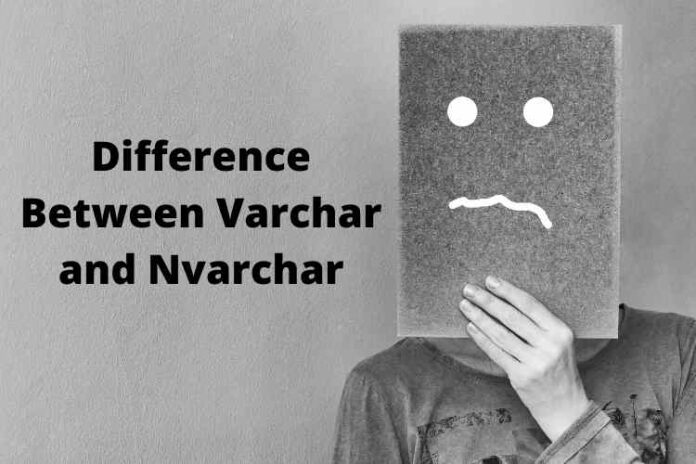Varchar and Nvarchar are the two data types in SQL Server. Many people think they are the same but there are differences between Varchar and Nvarchar that you should know.
The main difference between Varchar and Nvarchar is that Varchar is used for storing nonunicode characters while Nvarchar is used for storing Unicode characters. Another difference is that in Varchar data storage is 1 byte per character while in Nvarchar data storage is 2 bytes per character. Infield the definition, Varchar supports up to 8000 characters while Nvarchar supports up to 4000 characters which is another difference between these two terms.
In this article, I will explain the Difference Between Varchar and Nvarchar. So read the full article to get detailed information and the major differences between Varchar and Nvarchar.
Meaning of Varchar
A Varchar is also known as Variable Character Field is a set of character data of indeterminate length. It is a datatype of SQL server which is related to the variable characters. Varchar is used for storing non-Unicode characters. In Varchar, memory allocation is based on inserted characters. Varchar fields can be of any size up to a limit that varies by database. If we talk about Microsoft SQL Server 2008, it has a limit of 8000 bytes. So in other words, in field definition, Varchar supports up to 8000 characters.
Meaning of Nvarchar
The Nvarchar is a data type of SQL server that stores character data in a variable-length field. Nvarchar data can be a string of single-byte or multibyte letters digits and other characters which are supported by the code set of your database locale. Nvarchar is used for storing Unicode characters. In the database, multiple languages can be stored and if other languages are being used, Nvachar will take twice the space for storing an extended set of characters. Infield definition Nvarchar supports up to 4000 characters.
Similarities between Varchar and Nvarchar
Before diving into the differences between Varchar and Nvarchar, it is worth knowing the similarities between the two. Here are some of the similarities between Varchar and Nvarchar.
- Both Varchar and Nvarchar support variable-length so storage size depends upon actual data stored.
- Both Varchar and Nvarchar are character data types.
- They both are used to store text or string values.
RELATED – Difference between Miralax and Metamucil
Major Differences between Varchar and Nvarchar
The following are the major differences between Varchar and Nvarchar which you should know while choosing the right data type for your columns in a table or database.
- Varchar is used for storing non-Unicode characters while Nvarchar doesn’t store non-Unicode characters as it is used for storing Unicode characters.
- In Varchar data storage is 1 byte per character while in Nvarchar data storage is not 1 byte per character.
- In Nvarchar data storage is 2 bytes per character while in Varchar data storage is not 2 bytes per character.
- Infield the definition, Varchar supports up to 8000 Characters while Nvarchar supports up to 4000 characters.
- In Varchar memory allocation is equal to the inserted number of characters plus two extra bytes for off-set whereas in Nvarchar memory allocation is equal to double of the inserted number of characters plus with extra bytes for off-set.
- We use Varchar when there are Unicode characters to be stored in column or variable whereas we use Nvarchar when there are Non-Unicode characters to be stored in column or variable.
- In the variable declaration or column definition, If the valve n of the optional parameter is not particular then it is regarded as 1 for Varchar and to for the Nvarchar.
- Some experts recommend Nvarchar always because all modern operating systems and development platforms use Unicode internally; this is why people prefer Nvarchar rather than Varchar.
- If you have requirements to store Unicode or multilingual data then Nvarchar is the better choice while Varchar is a better choice for your data type for normal use as it stores ASCII data.
- Nvarchar is twice as expensive as Varchar because each character occupies 1 byte in Varchar while each character occupies 2 bytes in Nvarchar.
- Varchar literals are surrounded with single quotes, for example, ‘John’ while Nvarchar literals are prefixed with N also, for example, N’John’.
- If you provide a long data type then the use of index can fail. For example in an SQL server when you have an index over a varchar column and present it as a Unicode string MS SQL server will not use the index.
Comparison between Varchar and Nvarchar
This is a short comparison chart between Varchar and Nvarchar:
| Parameters of Comparison | Varchar | Nvarchar |
| Data Type | It is a variable that has a length data type. | It is a variable that has length data type. |
| Characters | Used for storing non unicode characters. | Used for storing unicode characters. |
| Space | Occupies 1 byte of space per character. | Occupies 2 bytes of space per character. |
The Final Words
Varchar and nvarchar have different character types. Varchar uses non-Unicode data while Nvarchar uses Unicode data which is the biggest benefit. Both varchar and nvarchar have different data types that must be looked into. Navachar is more expensive than Varchar as varchar only saves data in a One-byte sequence while Nvarchar saves data in two bytes for each character. The maximum length between the two also varies as Varchar length is limited to 8000 bytes while Nvarchar length is limited to 4000 bytes. The storage size in Varchar is more straightforward in comparison to the Unicode data used in Nvarchar.
So I hope this article was helpful and you have got the difference between Varchar and Nvarchar data types in SQL Server.


